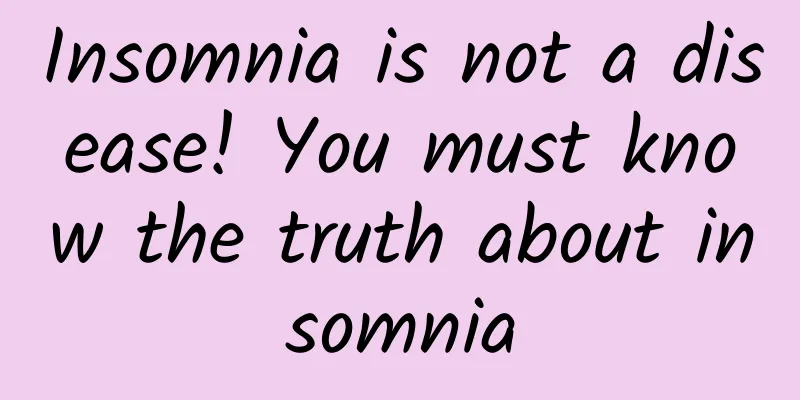Insomnia is not a disease! You must know the truth about insomnia

|
Sleepless nights, tossing and turning, and being unable to sleep at night... These words make people feel uncomfortable - not being able to sleep is really too exhausting! There are even many friends who are always exhausted physically and mentally because of poor sleep, which directly affects their life and work. So does poor sleep mean insomnia? How can we sleep better? Let's talk about the misunderstandings about insomnia and some tips to deal with it. Does not being able to sleep mean insomnia? When it comes to insomnia, many people's first reaction may be "Isn't that just not being able to sleep?" In daily life, this may be a correct understanding, but if you can't sleep occasionally, it is not necessarily insomnia. Insomnia in the strict sense includes two elements: One is that the patient is dissatisfied with the quality of their sleep periodically, such as having trouble sleeping two or three times a week for three months. This factor varies from person to person. If you experience difficulty sleeping once a month and it really affects you, it may also be an insomnia problem. Second, the patient is too concerned about sleep and is troubled by sleep problems, becoming easily angry and upset. Sometimes through recording, it is found that the patient's sleep quality is still good, but the patient himself thinks that his sleep is very bad. Copyright images in the gallery. Reprinting and using them may lead to copyright disputes. To sum it up simply, insomnia does not simply refer to the state in which people cannot fall asleep, but should include the following two major elements: 1. Longing to sleep but unable to sleep. 2. Being very concerned about the problem of not being able to fall asleep. Why do we need to clarify the definition of insomnia first? This is because for many people, the root cause of their sleep problems is that they have a misunderstanding of "insomnia" and are too afraid and worried about it: “I’m worried that if I can’t sleep, I’ll have health problems.” "I'm afraid if I can't sleep at night, I'll feel lonely and bored." “I was worried about not being able to function properly the next day and that I would have trouble maintaining my energy at work.” “I found that other health issues and body aches would get exacerbated whenever I couldn’t sleep.” In fact, some people do have trouble sleeping occasionally, but they don’t take it as a big deal, let alone directly regard it as “insomnia”. Such a good attitude is very helpful to avoid insomnia. Simply put, accept the fact of insomnia, and you may fall asleep faster. I feel like I didn't sleep Did you really not fall asleep? Many insomniacs will insist that they did not sleep all night or slept for a very short time, but in fact, through observation and records, it can be found that their sleep time is not short. This situation is often "paradoxical insomnia". In fact, many people who feel that they have insomnia all night sleep normally. On the contrary, many people think they sleep well, but when they wake up, they find that they are tired all over. In fact, they did not sleep well. The reason is actually very simple. For example, if you ask a question like "What does your snoring sound like?" I believe no one can answer it. This just illustrates the core difficulty of obtaining an individual's sleep status - people cannot answer because they are asleep. If you don't believe it, you can do a small experiment in certain situations where you need to stay up late (but don't stay up late often). You can record what time your relatives and friends go to bed, then record the time they wake up, calculate how long they sleep, and then ask them how long they think they sleep (don't let them look at the watch), you will be surprised. Copyright images in the gallery. Reprinting and using them may lead to copyright disputes. In short, our actual sleep time is usually completely different from our perception of sleep time. We tend to underestimate our actual sleep time, and some people with anxiety or light sleep often have this experience. If you have the same problem, then you have to believe that you are not alone, because this phenomenon is not uncommon. It should be noted that this is not to say that these insomnia patients are "lying", but to make everyone aware that sometimes our own perception of sleep time is unreliable. If we can realize this, our anxiety will be reduced and we will be less likely to suffer from insomnia. Is it necessary to get eight hours of sleep? We often hear things like "you need to sleep 8 hours a night", so much so that if you don't get 8 hours of sleep, you're a little worried about the impact on your health. For some friends who sleep less, this idea may cause anxiety and affect their sleep. In fact, the so-called "eight hours of sleep" is just a very imprecise number. Sleep needs vary from person to person and often decrease with age. For example, we all know that apart from eating, babies mainly sleep, and can sleep for more than ten hours a day. School-age children sleep less. Adults generally need 7 to 9 hours of sleep, while the elderly only need about 8 hours of sleep. However, if it comes to individuals, there are still great differences, so there is no need to regard 8 hours of sleep as the only standard for sleep quality. As long as we fall asleep easily, do not wake up easily during sleep, are not troubled by dreams, and feel clear-headed and energetic after waking up, it means that our sleep quality is good. So, for those of you who have trouble falling asleep, what methods can you try? Tips to improve your sleep 1. Black Although some people are used to turning on a night light when they go to bed at night, if you have trouble falling asleep, you might as well start by adjusting the light in your bedroom. In short, if you want to have a good night's sleep, cover all light sources. So how dark should the room be? There is an idiom "stretching one's hand out is pitch dark", and this is roughly the point. For example, we can use curtains with better light blocking, turn off those electrical appliances with LED lights, etc. 2. Comfortable bed and bedding A comfortable and pleasant bed and a dark environment are equally important (note that comfort does not necessarily mean buying an expensive one). Choose a bed that makes you feel comfortable, a bedding fabric that makes you feel safe and comfortable, and try a few different pillows and choose the one that makes you most comfortable. These will all help you sleep. 3. Adjust the bedroom environment Sometimes, just entering your bedroom can be painful because you have trouble falling asleep. Changing your bedding, adjusting your bedroom layout, and more can give your bedroom a fresh look and reduce your anxiety and stress. 4. Sleep alone when necessary Sometimes family members, children and even pets may disturb our sleep, so it is better to go to bed alone. Copyright images in the gallery. Reprinting and using them may lead to copyright disputes. There are also some things that will affect our sleep, so don't do them. Smoking Drinking Drink coffee Vigorous exercise before bed Using electronic products such as mobile phones and pads before going to bed Finally, if we can correctly understand insomnia, reduce anxiety, and develop good sleeping habits, it can play a positive role in avoiding and improving insomnia. If you really find it difficult to solve your sleep problems through self-adjustment, you can go to the sleep clinic to seek help from a professional doctor. Sleep Evolution China Science and Technology Press author (US) W. Chris Winter | Translator: Chi Wencheng/Gao Shuo Put aside sleep misconceptions and activate your primal drive Heal your sleep disorders and unleash your unlimited potential As an internationally recognized sleep medicine expert and neurologist, W. Chris Winter has helped tens of thousands of patients around the world improve their sleep problems. In this excellent self-help guide to sleep, Dr. Winter will help you customize a personalized sleep solution based on your lifestyle: Sleep efficiency calculation Insomnia and anxiety relief The problem of a partner’s snoring Relieve drug dependence Disruption of biological clock regulation Bedding preparation before bed Whether you are a student under great pressure, a worker who is exhausted both physically and mentally, or a highly sensitive person prone to mood swings, "Sleep Evolution" can help you get long-term high-quality sleep and regain a high-energy life. Source: Book "Evolution of Sleep", Science and Technology Press of China Author: W. Chris Winter (USA) | Translator: Chi Wencheng Gao Shuo |
<<: Is acupoint thread embedding therapy for weight loss really effective?
Recommend
How to promote ovulation to ovulate quickly?
Women have an ovulation period every month, and o...
How long after giving birth can I drink milk?
Milk is a drink with very high nutritional value....
Guide to blood pressure management under climate change: Understand the "test questions" that weather poses to blood vessels
(The full text is about 1,500 words and takes 3 m...
What causes breast pain in girls?
Breasts are the most glorious symbol of women, bu...
Can I drink turtle soup during confinement?
After giving birth, women are physically and ment...
Steps for pregnant women to wash their hair with mugwort water
Mugwort is a Chinese herbal medicine that is very...
Can pregnant women do yoga?
Yoga is an exercise for regulating the body and m...
A 9-year-old boy in Hunan has "grapes" growing in his head! This disease is very exciting
Severe headache, high fever, aphasia, hemiplegia,...
What happens if there is more leucorrhea?
Normal leucorrhea is composed of a mixture of vag...
Diagram of invalid early pregnancy test paper
I believe that many female friends have experienc...
Is cupping okay during breastfeeding?
I believe that many friends will not feel unfamil...
How to judge the expulsion of gestational sac during medical abortion
After external injection or oral administration o...
What to do if pregnant women have red eyes
Pregnant women are prone to some physical abnorma...
What to do if your knee hurts after a cesarean section
Compared with natural birth, cesarean section is ...
How to gather breasts
When a woman's breasts develop to the sides, ...









